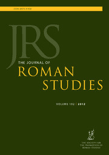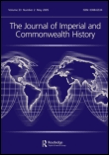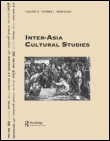
Genealogy
Scope & Guideline
Unraveling the Mysteries of Genetic Inheritance
Introduction
Aims and Scopes
- Interdisciplinary Genealogical Research:
The journal promotes a diverse range of methodologies from various disciplines, including history, sociology, anthropology, and cultural studies, to investigate genealogical phenomena and their implications across different communities. - Cultural Identity and Memory:
A consistent focus on how genealogical research intersects with cultural identity, collective memory, and personal narratives, particularly in marginalized communities and diasporas. - Ethics and Politics of Genealogy:
An exploration of the ethical considerations and political dimensions of genealogical research, including issues of representation, appropriation, and the impact of genealogy on identity formation. - Migration and Transnationalism:
A significant area of focus is the genealogical implications of migration and transnationalism, examining how familial and cultural connections transcend national boundaries. - Indigenous and Decolonial Perspectives:
The journal emphasizes Indigenous methodologies and decolonial approaches to genealogy, advocating for the reclamation of ancestral knowledge and narratives. - Genealogical Technologies and Digital Humanities:
Exploration of how emerging technologies, including DNA testing and digital archives, shape contemporary genealogical practices and understandings.
Trending and Emerging
- Decolonial and Indigenous Genealogies:
There is a growing emphasis on decolonial approaches to genealogy, particularly in relation to Indigenous peoples' histories and the reclamation of ancestral knowledge. - Mental Health and Genealogy:
Research exploring the intersections between genealogical research and mental health, including the psychological impacts of uncovering family histories, is gaining traction. - Genealogy and Racial Identity:
Emerging scholarship is increasingly focused on how genealogy informs racial identity, particularly in discussions surrounding mixed-race identities and racial justice. - Digital Genealogy and Technology Integration:
The use of technology in genealogical research, including social media, DNA testing, and online databases, is becoming a prominent theme, reflecting the digital transformation of the field. - Narratives of Trauma and Healing:
Themes related to trauma, particularly in the context of historical injustices and contemporary societal challenges, are increasingly prevalent, highlighting the role of genealogy in personal and collective healing. - Community-Based Genealogical Practices:
A focus on community engagement and participatory research in genealogy, emphasizing how local histories and collective memory shape identities and social cohesion.
Declining or Waning
- Traditional Genealogical Methods:
There has been a decline in the emphasis on traditional genealogical methods centered around paper records and lineage charts, as digital tools and DNA analysis become increasingly dominant. - Nationalistic Genealogy:
Research that ties genealogy strictly to notions of national identity or heritage has waned, reflecting a broader shift towards more complex, intersectional understandings of identity. - Linear Historical Narratives:
There is reduced attention on linear, chronological narratives of genealogical history, as contemporary approaches favor more fluid and dynamic interpretations of ancestry. - Focus on Eurocentric Genealogical Perspectives:
Studies emphasizing Eurocentric genealogies are becoming less prevalent, as the journal increasingly prioritizes diverse global perspectives and Indigenous histories.
Similar Journals

SALMAGUNDI-A QUARTERLY OF THE HUMANITIES AND SOCIAL SCIENCES
Challenging Conventional Narratives in the Arts and HumanitiesSALMAGUNDI: A Quarterly of the Humanities and Social Sciences is a distinguished journal dedicated to fostering critical discussions within the realms of humanities and social sciences. Published by SALMAGUNDI and housed at Skidmore College in Saratoga Springs, NY, this journal has been serving the academic community since its inception in 1987. Although it operates under a subscription model, its commitment to exploring diverse perspectives in cultural studies, literature, and the arts remains unwavering. With its current rankings placing it in the lower quartiles of its categories in Cultural Studies, Literature, and Visual Arts, SALMAGUNDI presents a platform for emerging ideas and underrepresented voices that challenge conventional narratives. As the journal charts its course towards the year 2024, it continues to invite scholars, professionals, and students to engage with its rich content, fostering a collaborative environment of intellectual growth and inquiry.

JOURNAL OF ROMAN STUDIES
Advancing Knowledge of the Ancient WorldThe JOURNAL OF ROMAN STUDIES, published by Cambridge University Press, is a prestigious academic journal dedicated to the exploration of the Roman world through archaeological, historical, and literary lenses. With a rich publication history dating back to 1911, this journal has established itself as a leading platform for groundbreaking research in the fields of Classics, History, and Visual Arts, holding Q1 rankings in multiple categories as of 2023. Scholars from around the globe rely on its rigorous peer-reviewed articles to inform their work and advance the understanding of Roman culture and society. Although it operates under a traditional access model, the journal's impact factor and broad bibliographic reach ensure that it remains an invaluable resource for researchers, students, and professionals alike. With its continued commitment to excellence, the JOURNAL OF ROMAN STUDIES not only contributes to academic discourse but also invites new insights into the timeless relevance of Roman studies.

Estudios Historicos
Challenging Perspectives on History with Scholarly PrecisionEstudios Historicos is a distinguished academic journal dedicated to the exploration and analysis of historical events, theories, and methodologies within the field of historical studies. Published by the CENTRO DOCUMENTACION HISTORICA RIO PLATA PROF DR WALTER RELA, this journal serves as a critical platform for scholars and researchers interested in disseminating their findings on Latin American history, with a strong emphasis on Uruguay's historical context. The journal, bearing the ISSN 1688-5317, fosters an environment for rigorous scholarly debate and is committed to advancing the understanding of historical dynamics through interdisciplinary approaches. Although Estudios Historicos operates under a traditional access model, its potential for impact within the academic community is significant. With the objective of providing high-quality research and facilitating informative discussion, this journal invites contributions that push the boundaries of historical inquiry, making it a vital resource for students, professionals, and researchers aiming to deepen their knowledge and engagement with the past.

Miscelanea de Estudios Arabes y Hebraicos-Seccion Arabe-Islam
Advancing Knowledge in Arabic and Islamic HeritageMiscelanea de Estudios Arabes y Hebraicos-Seccion Arabe-Islam is a distinguished academic journal dedicated to the study of Arabic and Islamic studies, published by UNIV GRANADA, EDITORIAL. With an ISSN of 1696-5868 and E-ISSN 2341-0906, this publication provides a vital platform for scholars and researchers interested in the deep historical, cultural, and linguistic connections between the Arab and Hebrew worlds. Situated in the heart of Granada, Spain, this journal aims to promote interdisciplinary approaches and foster dialogue among academics in these rich fields of study. Although it operates under traditional access protocols, the journal’s commitment to quality is reflected in its rigorous peer-review process, making it a valuable resource for researchers, professionals, and students alike. By engaging with cutting-edge research and critical perspectives, the journal plays an essential role in enhancing the understanding of Arabic and Islamic heritage today.

JOURNAL OF IMPERIAL AND COMMONWEALTH HISTORY
Engaging with the dynamics of history and political science.The JOURNAL OF IMPERIAL AND COMMONWEALTH HISTORY, published by Routledge Journals, Taylor & Francis Ltd, stands as a pivotal platform for scholarly discourse in the fields of imperial studies, history, and political science. This esteemed journal, with an ISSN of 0308-6534 and E-ISSN 1743-9329, has been contributing significantly to academic discussions since its inception in 1972 and continues to publish until 2024. With its categorical rankings placing it in Q1 in History, alongside emerging categories in Development and Political Science, it appeals to a wide array of researchers, professionals, and students interested in the complexities of historical and contemporary issues within imperial and commonwealth contexts. The journal's commitment to rigorous academic standards is reflected in its impressive Scopus rankings, which position it in the top percentiles of its respective fields. While currently not an open access journal, it remains a valuable resource for those looking to enhance their understanding of historical impacts and political relations in the imperial context, thereby solidifying its role as an essential tool for scholarly exploration and inquiry.

Eminak
Connecting Disciplines, Cultivating ExcellenceEminak, an esteemed academic journal published by the Scientific Research Centre Lukomorie, serves as a vital platform for scholarly discourse in the fields of Archeology, History, and Political Science, contributing significantly to the growth of knowledge across these interconnected disciplines. Established in Ukraine, this Open Access journal has been active since 2018, enabling wide dissemination of research findings without barriers. With a commendable Q2 ranking in Archeology and Political Science, and a prestigious Q1 ranking in History for 2023, Eminak is recognized for its impact, attracting a diverse range of manuscripts from both established and emerging scholars. Its inclusion in Scopus further underscores its contribution to academic inquiry. Operating under the ideals of accessibility and academic excellence, Eminak promises a rigorous peer-review process, empowering researchers, professionals, and students alike to engage with the latest advancements in their fields.

FILOZOFSKI VESTNIK
Engaging Minds with Thought-Provoking ResearchFILOZOFSKI VESTNIK, published by ZRC PUBLISHING, is a notable academic journal based in Slovenia, dedicated to the exploration and analysis of philosophical and religious studies. With an ISSN of 0353-4510 and an E-ISSN of 1581-1239, this journal has been in continuous circulation since 2002, establishing itself as a critical platform for disseminating research within its field. Recognized in 2023 as a Q2 journal in Religious Studies within its category quartiles, FILOZOFSKI VESTNIK ranks #449 out of 644 in Scopus, reflecting its growing influence and contribution to the scholarly community, with a percentile ranking in the 30th. Although not an open-access journal, it remains accessible to a wide audience, fostering engagement and discourse among researchers, professionals, and students. The journal aims to publish high-quality articles that advance the understanding of philosophical dimensions in contemporary religious discourse, making it an invaluable resource for those invested in these critical fields of study.

International Journal for History, Culture and Modernity
Navigating the Complexities of Society Through TimeThe International Journal for History, Culture and Modernity, published by BRILL, stands as a pivotal platform for scholars and practitioners in the fields of history and cultural studies. With an ISSN of 2666-6529 and an E-ISSN of 2213-0624, this journal has been contributing to academic discourse since its inception in 2015. Focusing on contemporary historical analysis, cultural narratives, and modernity, it aims to unravel the intricacies of past and present, thereby fostering a nuanced understanding of societal evolution. Indexed in Scopus with notable rankings—Q2 in History and Q3 in Arts and Humanities (miscellaneous)—it appeals profoundly to researchers and students alike. The journal's commitment to open access ensures that its scholarly contributions remain widely available, making it an essential resource for those dedicated to advancing knowledge in the humanities. Situated in Leiden, Netherlands, at PLANTIJNSTRAAT 2, P O BOX 9000, it embodies a tradition of academic excellence that is integral for contemporary scholarship.

BULGARIAN HISTORICAL REVIEW-REVUE BULGARE D HISTOIRE
Exploring Historical Narratives: Bridging Bulgaria and BeyondBULGARIAN HISTORICAL REVIEW - REVUE BULGARE D HISTOIRE is a distinguished journal published by the PUBL HOUSE BULGARIAN ACAD SCI, providing a critical platform for the exploration and analysis of historical narratives pertinent to Bulgaria and its broader regional context. With an ISSN of 0204-8906, this journal has been a reservoir of scholarly research since its inaugural issue, recently covering years from 2001 to 2007 and again from 2009 to 2023. Despite its classification in the Q4 category of History, it uniquely contributes to understanding and preserving historical insights, as reflected in its modest but growing impact in the academic community, where it currently ranks #1405 out of 1760 in Scopus Analytics. The journal aims to engage researchers, professionals, and students by presenting a diverse array of articles, encouraging scholarly discourse that sheds light on historical complexities and advancements. While it currently does not adopt an open-access model, it remains a crucial resource for those engaged in historical studies, particularly in Eastern European contexts.

Inter-Asia Cultural Studies
Advancing Interdisciplinary Dialogue Across AsiaInter-Asia Cultural Studies is a premier scholarly journal published by Routledge Journals, Taylor & Francis Ltd, dedicated to advancing the field of Cultural Studies within an Asian context. With its Q1 ranking in Cultural Studies and an impressive Scopus rank placing it in the top 70th percentile among its peers, this journal has established itself as a leading platform for interdisciplinary research. Since its inception in 2005, Inter-Asia Cultural Studies has facilitated dialogue and scholarship that explores the complexities of cultural practices across Asia, offering critical analyses that resonate on a global scale. Although it does not operate under an Open Access model, its contributions are integral for researchers, professionals, and students seeking in-depth understanding and insights into the dynamic cultural landscapes of Asia. With a commitment to fostering innovative and impactful research, this journal continues to play a vital role in shaping contemporary discussions in the field.